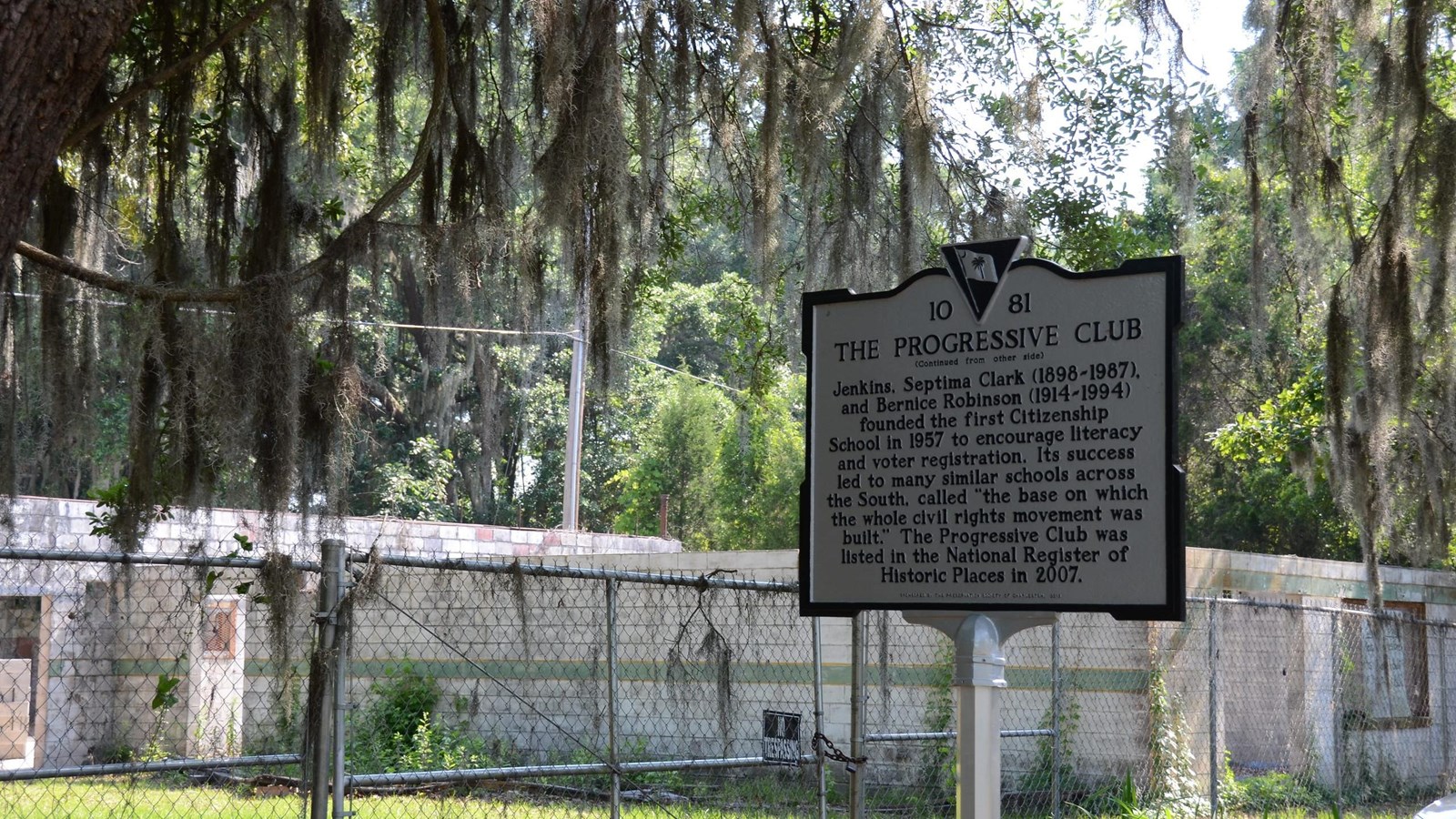Last updated: September 23, 2021
Place
South Carolina| The Progressive Club of Johns Island

Preservation Society of Charleston
The Progressive Club Sea Island Center on Johns Island, South Carolina is significant for its role as a Citizenship School and for its association with events and persons important in the African American Civil Rights movement. The club building on the National Register of Historic Places for its association with the development of continued adult education, social history, politics, ethnic heritage, recreation, and commerce for the African American community of the Sea Islands beginning with the building’s construction in 1963 until the death of the Club’s founder Esau Jenkins in 1972. The structure and site served as a vital community center, providing a home for the Progressive Club’s legal and financial assistance program, adult education program, dormitory lodging, and as a community recreational facility, childcare center, meeting place and grocery store.
In 1948, Jenkins formed the club with Joe Williams after an island local, Sammy Grant, was shot by a white man while defending himself from an attack by the man’s dog. The case against the dog owner was dismissed by a magistrate judge, and Jenkins and Williams raised money from other islanders to appeal the judge’s decision. Their efforts were successful, and the dog owner was convicted of aggravated assault. Jenkins and Williams decided to create an organization that would help secure funds and legal help for the local Black community. They called their organization the Progressive Club, and members helped islanders find solutions to a variety of problems, such as finding transportation to work in neighboring Charleston. For this purpose, Jenkins secured a bus for work commuters as well as island children who needed to get to school.
In August 1954, Esau Jenkins was encouraged to travel to Tennessee to attend a workshop and to meet with Miles Horton of Highlander Folk Center, a social justice leadership training and education center. At the August 1954 workshop Jenkins explained that the Island community needed trained educators to establish an adult education and citizenship class to teach adult African-American Island residents how to read and write. The week’s workshop also stimulated Esau’s interest in developing a more robust political action strategy on the island by finding people to help get the island’s Black community registered to vote. Septima Poinsette Clark was just the person to do just that. The following summer Clark attended a similar workshop. Clark, a native of Johns Island, would eventually begin working as a field representative for the Highlander Folk Center. She had been fired as an elementary school teacher by the State of South Carolina because of her membership in the NAACP. While at Highlander, Clark developed what would ultimately become the general curricula for Citizenship Schools. Clark and Bernice Robinson also began a program at the Progressive Club to train new citizenship schoolteachers.
In 1956 the club purchased the vacant Mount Zion Elementary School to serve as its headquarters. The school building needed extensive work, including electricity and indoor plumbing. The club was able to restore the building with the financial support of its members and the Highlander Folk Center. The Citizenship School within the Progressive Club – inspired by the Highlander Folk Center – opened in the former school building in 1957.
The success of the Citizenship School led to the development of other Citizenship Schools on other rural islands in South Carolina, such as Edisto and St. Helena. In 1962, the old Mt. Zion Elementary School was razed, and the current, larger structure called The Progressive Club Sea Island Center was built in its place. The new building broke ground in October of 1962 and was completed in March of 1963. The new building was able to provide more services and programs to a larger area, and the new center served not only Johns Island, but also those from nearby James and Wadmalaw Islands. The new structure also included a grocery store with fuel pumps in the front of the building; a multi-purpose room that was used as a gymnasium, classroom, community center, day care and commercial kitchen. Additionally, four dormitories for over-night visitors had also been added. These facilities created a safe environment for the community to congregate and hold meetings. Many workshops were held there and were often led or attended by nationally recognized leaders in the movement. For instance, Rev. Dr. Martin Luther King, Jr. came to Johns Island twice to attend meetings and workshops at the Progressive Club and stayed at the home of Esau and his wife Janie Jenkins. The workshops offered at the new center represented the success of the Progressive Club’s initial mission of literacy education and voter registration.
After Jenkins’ death in 1972, many services offered by the club came to an end, though the grocery store continued to operate until 1975. The grocery store remained until Hurricane Hugo damaged the roof of the building in 1989. The Progressive Club had no insurance on its building, and the club was denied funds by FEMA. Today club members are hoping to restore the building and continue the legacy of community building and social justice. In 2007, the Progressive Club Sea Island Center was listed in the National Register of Historic Places.
In September 2021, the Progressive Club was added to the African American Civil Rights Network for its connection to the civil rights movement.
The African American Civil Rights Network recognizes the civil rights movement in the United States and the sacrifices made by those who fought against discrimination and segregation. Created by the African American Civil Rights Act of 2017, and coordinated by the National Park Service, the Network tells the stories of the people, places, and events of the U.S. civil rights movement through a collection of public and private resources.
